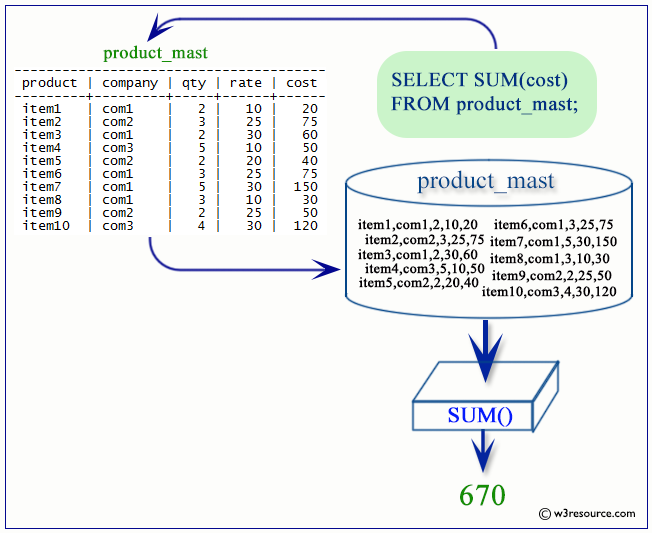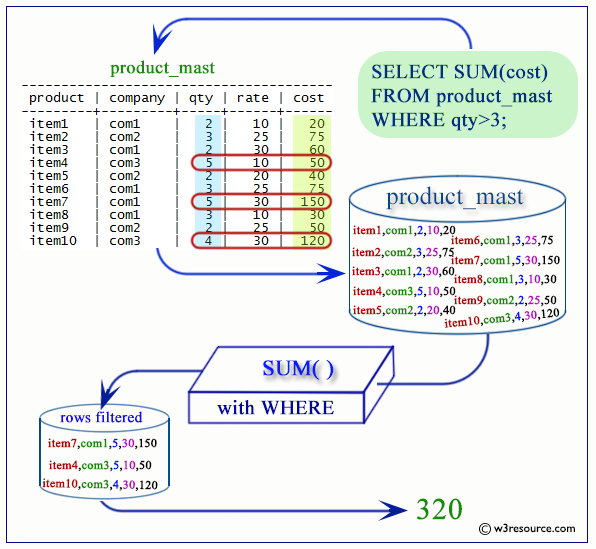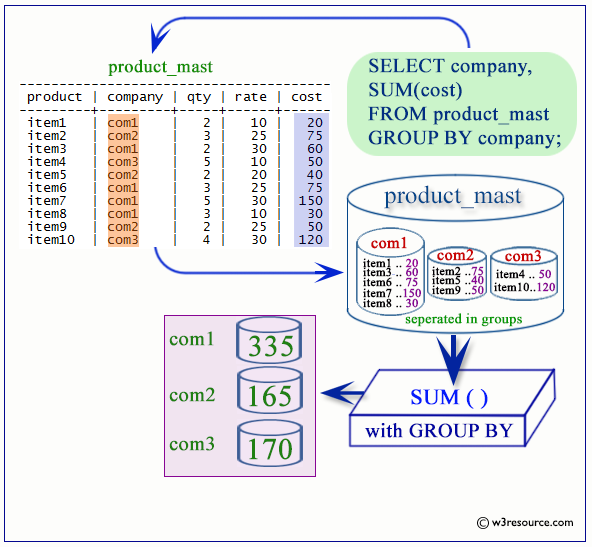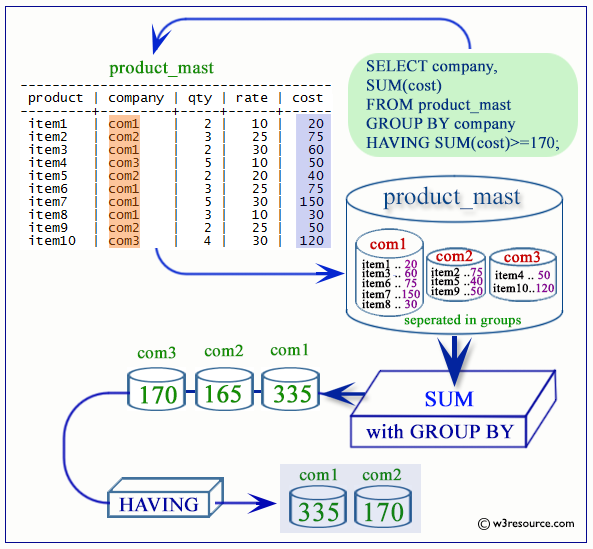PostgreSQL SUM function
SUM function
The SUM function in PostgreSQL returns the sum of values for the list of selected columns.
Syntax:
SUM (* | [DISTINCT] ALL | column_name)
Parameters:
| Name | Description |
|---|---|
| column_name | Name of the column |
| * | The asterisk(*) indicates all the rows. |
| DISTINCT | This clause is optional. It indicates uniqueness. |
| ALL | This clause is optional. It is default clause. |
Contents:
PostgreSQL SUM function example
The sample table
If we want to calculate the total sum of salary for all employees in the employee table, the following SQL can be used.
SQL Code:
SELECT SUM(salary)
FROM employee;
Output:

Visual Presentation of PostgreSQL SUM()
PostgreSQL SUM as a level
If we want to calculate the total sum of salary for all employees and show the result against 'Total Salary' head in the employee table, the following SQL can be used.
SQL Code:
SELECT SUM(salary) AS "Total Salary"
FROM employee;
Output:

PostgreSQL SUM DISTINCT
If we want to get the sum of unique salary from employee table, the following SQL can be used.
SQL Code:
SELECT SUM ( DISTINCT salary)
FROM employee;
Output:

Explanation:
The above example shows that the sum of salary is smaller than the sum salary for all employees because the DISTINCT clause eliminates the repetition of each salary and summed only once.
PostgreSQL SUM WHERE clause
If we want to get the sum of unique salary from employee table who belongs to the deptno 15, the following SQL can be used.
SQL Code:
SELECT SUM ( DISTINCT salary) AS "Total Salary"
FROM employee
WHERE deptno=15;
Output:

Visual Presentation of PostgreSQL SUM with WHERE
PostgreSQL SUM with GROUP BY
Sample table: employees
The following statement will return the designation and total salary against each designation from the employees table.
SQL Code:
SELECT job_id,SUM(salary) AS "Total Salary"
FROM employees
GROUP BY job_id;;
Output:
job_id | Total Salary ------------+-------------- AC_ACCOUNT | 8300.00 ST_MAN | 36400.00 IT_PROG | 28800.00 SA_MAN | 61000.00 AD_PRES | 24000.00 AC_MGR | 12000.00 FI_MGR | 12000.00 AD_ASST | 4400.00 MK_MAN | 13000.00 PU_CLERK | 13900.00 HR_REP | 6500.00 PR_REP | 10000.00 FI_ACCOUNT | 39600.00 SH_CLERK | 64300.00 AD_VP | 34000.00 SA_REP | 250500.00 ST_CLERK | 55700.00 MK_REP | 6000.00 PU_MAN | 11000.00 (19 rows)
Visual Presentation of PostgreSQL SUM with GROUP BY
PostgreSQL SUM with WHERE CLAUSE and GROUP BY
Sample table: employees
The following statement will return the designation wise total salary for that designation which salary does not exceed 12000 and above, from employees table.
SQL Code:
SELECT job_id,SUM(salary) AS "Total Salary"
FROM employees
WHERE salary<12000
GROUP BY job_id;
Output:
job_id | Total Salary ------------+-------------- AC_ACCOUNT | 8300.00 ST_MAN | 36400.00 IT_PROG | 28800.00 SA_MAN | 21500.00 AD_ASST | 4400.00 PU_CLERK | 13900.00 HR_REP | 6500.00 PR_REP | 10000.00 FI_ACCOUNT | 39600.00 SH_CLERK | 64300.00 SA_REP | 250500.00 ST_CLERK | 55700.00 MK_REP | 6000.00 PU_MAN | 11000.00 (14 rows)
PostgreSQL SUM with HAVING CLAUSE and GROUP BY
Sample table: employees
The following SQL statement will return, designation wise total employees and total salary for that designation which salary does not exceed 12000 and above and a minimum of five employees have this designation.
SQL Code:
SELECT job_id,COUNT(*) AS "Number of Employees",
SUM(salary) AS "Total Salary"
FROM employees
WHERE salary<12000
GROUP BY job_id
HAVING COUNT(*)>=5;
Output:
job_id | Number of Employees | Total Salary ------------+---------------------+-------------- ST_MAN | 5 | 36400.00 IT_PROG | 5 | 28800.00 PU_CLERK | 5 | 13900.00 FI_ACCOUNT | 5 | 39600.00 SH_CLERK | 20 | 64300.00 SA_REP | 30 | 250500.00 ST_CLERK | 20 | 55700.00 (7 rows)
Visual Presentation of PostgreSQL SUM with HAVING
PostgreSQL SUM with GROUP BY and ORDER BY
Sample table: employees
The following statement will return, the designation wise total employees and total salary, arranged in descending order according to the total number of employees, for that designation which salary does not exceed 12000 and above and a minimum of five employees have this designation.
SQL Code:
SELECT job_id,COUNT(*) AS "Number of employees" ,
SUM(salary) AS "Total Salary"
FROM employees
WHERE salary<12000
GROUP BY job_id
HAVING COUNT(*)>=5
ORDER BY COUNT(*) DESC;
Output:
job_id | Number of employees | Total Salary ------------+---------------------+-------------- SA_REP | 30 | 250500.00 SH_CLERK | 20 | 64300.00 ST_CLERK | 20 | 55700.00 ST_MAN | 5 | 36400.00 FI_ACCOUNT | 5 | 39600.00 IT_PROG | 5 | 28800.00 PU_CLERK | 5 | 13900.00 (7 rows)





